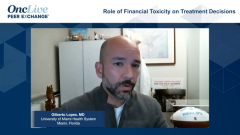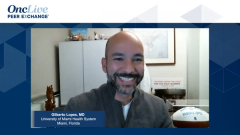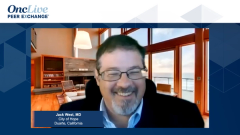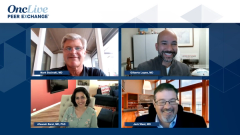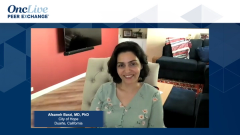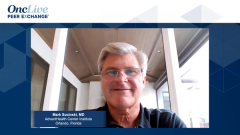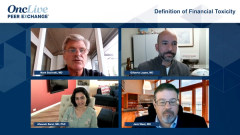
Mitigating Strategies Appropriate for EGFR Therapy and Financial Toxicity
Jack West, MD, and Gilberto Lopes, MD, share their thoughts on mitigating strategies of therapy associated with financial toxicity.
Episodes in this series

Mark Socinski, MD: Gilberto, I’m going to ask you to address this next point. We talked a little about the role of TKIs [tyrosine kinase inhibitors], certainly as the standard of care in patients with EGFR-mutant disease but also in terms of the financial toxicity. Are there mitigating strategies that are appropriate for these populations, or is this not a major issue because we have 1 leader in this field, and without other competitors, it’s hard to mitigate the financial toxicity?
Gilberto Lopes, MD: Absolutely. There are situations in which we see patients suffer from this financial toxicity, especially in terms of co-pays. Yes, the company that sells osimertinib has access programs that often will help patients pay that co-pay. Having said that, there are situations in which patients still need to pay a significant amount of money out of pocket. That’s the biggest barrier that we have in the United States, and when we look at access in different situations, in different countries, the situation is even more complex, so I’m not going to address that. Most of our audience is in the United States. I agree with what Dr [Afsaneh] Barzi had mentioned before. He mentioned that if CMS [Centers for Medicare & Medicaid Services] was able to negotiate prices, then this might help. It certainly may benefit the market as a whole to have some competition if osimertinib gets approved, based on the data that we saw and discussed earlier today. There are situations where that has happened.
We talked earlier about the use of gefitinib [Iressa] in Asia vs erlotinib [Tarceva] being a little cheaper a decade and a half ago. With that, gefitinib is getting a significant lead on the market. We also have drugs that have been developed in countries that have never gotten approved in the United States or Western Europe, like icotinib [Conmana], which is the EGFR inhibitor that has been approved in China for the better part of a decade. This has also included an increased competition in that country and has brought prices down. It’s not that we don’t know that it happens, but it’s in the United States, so we have only 1 option—there’s absolutely no competition.
Unfortunately, when we look at other situations with competition among PD-L1 inhibitors, we don’t see a significant decrease in price. Every company is trying to protect them and is worried that if they create competition in this indication, come 5, 10 years, you have a new indication. Their competitors would do the same and would cut prices more. It’s a difficult conundrum that companies have, and that’s when regulators come in. Competition really doesn’t bring prices down. This is something that we don’t have an easy answer to, and we certainly have to be here, informing our communities, our colleagues, and society in general, so that we can address this difficult situation.
Mark Socinski, MD: I’m sure. Go ahead.
Jack West, MD: I was going to ask Gilberto, or anybody, to comment on what if 1 company breaks ranks and lowers the cost. Let’s be honest, if the drug is priced at $10,000 instead of $18,000 a month, and you capture a big part of the market, you’re still going to be making money hand over fist. There’s a ton of meat on the bone here. Everyone has to put their toes on the line, and if 1 company breaks that pattern, can that be constructive? I don’t know. It’s not like a race to the bottom, because there’s a ton of profit to be made and no one would begrudge a pharmacy company a healthy profit. It’s an extortionate circumstance that we don’t want.
Transcript edited for clarity.


